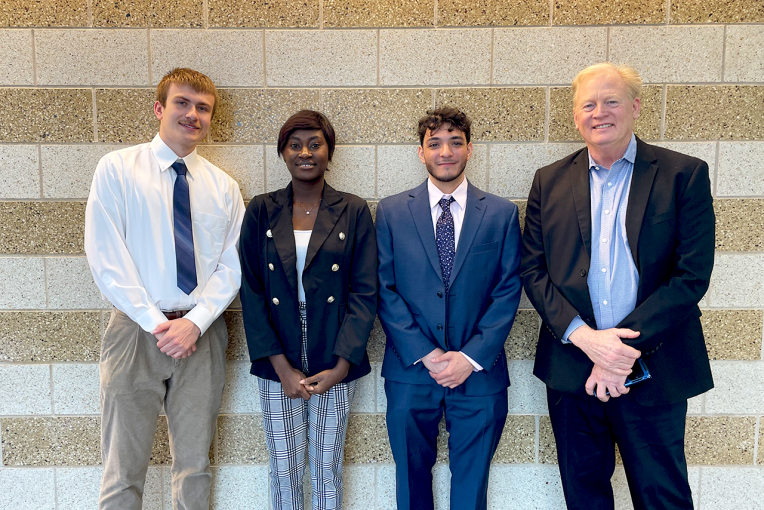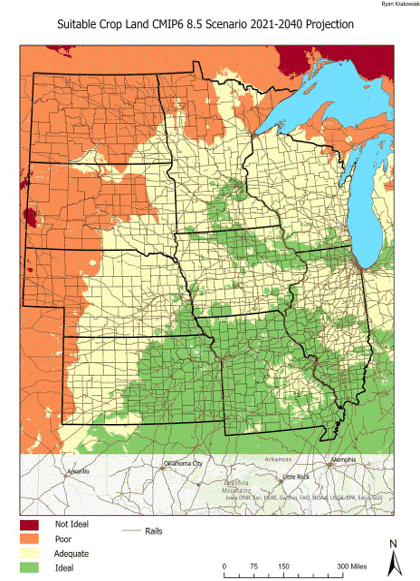A team of three Innovation Consulting Community (ICC) students combined their cross-disciplinary expertise to study the effects of climate change on Midwest farming for agriculture cooperative Growmark.
Junior business information systems major Malik Khatib, senior environmental science and geographic information science (GIS) analytics major Ryan Krakowiak, and first-year agribusiness graduate student Lawrencia Mensah first partnered with Growmark in November.
Since then, the team compiled extensive research, and Krakowiak used GIS software to create maps illustrating the Midwestern climate.
“I approached this as a real-world scenario,” said Krakowiak. “Post-graduation, this is something I could realistically be doing for an environmental consulting firm or possibly the government. I think practice makes perfect, and the more comfortable you can get doing something reflects in your work afterwards.”
Growmark Director of Internal Audit David Loyd met with the ICC research team periodically, but he left most of the project open-ended for the students to explore.
“He was excited for the opportunity for us because he wanted to let us run with it and see what we would come up with on our own,” said Krakowiak.
As the project manager, Khatib established a plan for the focus of the team’s research, which he said changed throughout the semester as the scope of the project evolved.
“The project taught me how to collaborate with people from different backgrounds, how to organize better, and how to effectively communicate with my teammates,” said Khatib.
The students presented their research as part of the Katie School of Insurance and Risk Management Research Symposium on April 20. A few weeks later, they presented their findings at Growmark’s Bloomington headquarters to Growmark Executive Vice President and Chief Financial Officer Brad Drake, MBA ’12.
“The students knew the science and seemed grateful for the opportunity to work on the project and were excited about the subject matter,” said Drake. “The presentation itself was professional, and I was impressed with the delivery of their material.”
Drake said the project gave students the opportunity to practice research, storytelling, and communicating information in a concise way in a professional setting. For a business, the ICC project allows companies to consult an outside perspective and utilize the information to drive conversation.
“I’d be interested in participating more with ICC and doing more of these projects and getting more of our business units involved to get that exposure to thinking differently and to thinking longer term,” said Drake. “Depending on the information delivered and the conclusions drawn, that could help us make or break certain decisions that we may be indifferent about.”
Khatib, Krakowiak, and Mensah said they will incorporate the ICC project into their resumes and portfolios and expect to use the experience post-graduation.
“It teaches us to be persistent, creative, and resilient,” said Mensah. “When you see the results you produce, you feel satisfied.”
Since 2017, the ICC program has connected organizations that need help solving a problem with Illinois State students who use their unique perspectives and areas of expertise to develop solutions. Jim Jones, the executive director of the Katie School of Insurance and Risk Management and an ICC mentor, said students gain experience taking initiative, managing a project, collaborating, and understanding the needs of a real-world client.
“Students learn to deal with ambiguity and develop confidence in their own ability to learn something without somebody necessarily teaching them in a classroom,” said Jones.
This year, the ICC program sponsored three clients and over 60 student participants, including Growmark’s “Effect of Climate Change on Agriculture in the Midwestern United States” project.
Jones said in his seven years helping with the program, his favorite part is watching all the groups present their final research projects.
“They come to this full realization—they’ve synergized what they’ve learned. It all comes together, and the client loves it, and they love it, and they feel good about it and feel confident,” said Jones. “Seeing it all come together at the end is a magical thing.”


